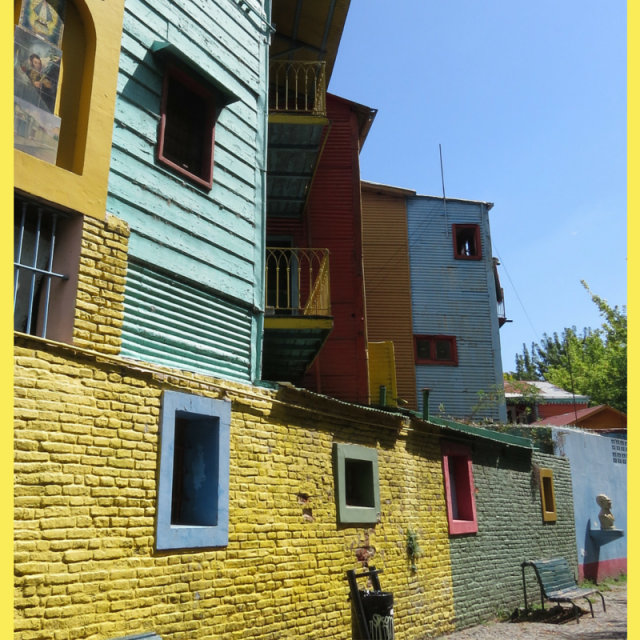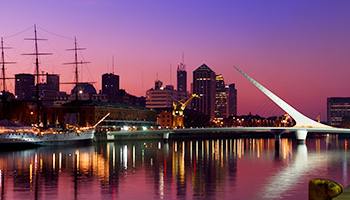CEA Buenos Aires offers the ideal setting for study abroad with a diverse range of courses in a cultural setting that has retained its many old, European traditions while emerging as a political, commercial and industrial center of Argentina.
Below, some professors from the Universidad del Belgrano and the CEA Buenos Aires Center give insight into some courses offered through the schools in Buenos Aires.
Want to study abroad in Argentina with CEA? Check it out here!
Course: Spanish for Business
Prof. Graciela Lehmann
"At Spanish for Business, we work towards an understanding of all business related issues. Lots of people believe that money makes the world go round so we visit the center of dealing with all money issues- the Central Bank of Argentina. Its museum holds a particular interest: not only collects, preserves and exhibits relics and objects related to the life of this institution and testimonies of Argentine economic history, but also covers the history of the country from its currency. In this regard, visiting the Museum offers students a gate to understand the political events, the economic issues and cultural aspects that gave shape to present Argentina. The country's ups and downs may be seen in its currency and several examples of economic and political history would inspire students to ask questions and understand the impact of economic history and the variety of recent crises on daily life."
Course: Intermediate Spanish
Prof. Ariadna Castellarnau
"Learning a language while abroad means immersing in Buenos Aires culture, life, and its people. Thus, Spanish Language classes are always an opportunity for sharing activities in different sites, from a museum to a shopping mall, the Central Station, or just a café porteño. Visiting the Museum of Malvinas and South Atlantic Islands enable students to grasp much of Argentina's history from a new perspective: the importance of territory and memory in building Argentine national identity. Its location at ESMA (former Naval Academy and detention center during Dirty War years) means having first-hand experiences of what has happened in the 70´s and how Argentines deal with this conflictive past today."
Course: The Culture of Food & Wine in Argentina
Prof. Lisa Ubelaker Andrade
"In Food and Wine we learn that in Argentina, everything truly revolves around food. We investigate Argentina's politics and discover how food industries like beef and soy sit at the very center of Argentina's fluctuating economy and its way of life. We travel to food markets all over the city, conduct ethnographic research, and observe how food traditions have changed over time. And, of course we eat! We experience cooking foods, we learn to train the five senses and experience new flavors, and see how food is a window into cultural heritage. When students come out of Food and Wine--they don't just understand food traditions, they have a strong grasp of Argentina's history, its cultural roots, and some of the major issues facing the country today."
Course: Culture & Civilization of Argentina
Prof. Wendy Gosselin
"Culture and Civilization of Argentina provides a bird’s eye view of the most outstanding cultural expressions of Argentina. These expressions include tango, the history and themes of the country’s most famous export; soccer, with a focus on masculinity and how it plays out at the stadiums; and other types of popular music including rock nacional, cumbia and folklore. The goal is not to examine each of these expressions in isolation but to use them to begin to make connections about what it means to be Argentine. In addition, through these different topics, the course weaves a historical overview of Argentina from the end of the nineteenth century to today, pausing to examine important political movements such as Peronism and critical moments in the country’s history like the last military dictatorship. Excursions vary each semester but have included a local soccer match; a site of memory, where a clandestine detention center operated during the last dictatorship; and the recently inaugurated Nestor Kirchner cultural center. Besides these group excursions, over the course of the semester students are sent out on individual excursions in order to get to know the city and have their own experiences, which are later shared in class. Students thus obtain a broad understanding of Argentina as well as the sociological tools for eventually conducting their own research."
Course: Entrepreneurship: The Art of Creative Business
Prof. Jorge Almada
"Entrepreneurship course is a very complex one from the theory perspective, comprehending all business areas starting with the opportunity assessment, followed by strategy, value proposition development, involved resources, and finishing with financial considerations. Notwithstanding all these mandatory topics, it would be useless unless we strictly ground it with onsite discussions with real entrepreneurs, they provide a really relevant knowledge related with true experience, matching real life and theory in the business every day environment. Field trips are a key resource to bring a complete learning experience about Entrepreneurship, putting together academic concepts and its application in different economic activities."









